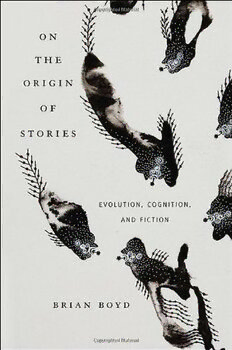Download On the Origin of Stories: Evolution, Cognition, and Fiction PDF Free - Full Version
Download On the Origin of Stories: Evolution, Cognition, and Fiction by Brian Boyd in PDF format completely FREE. No registration required, no payment needed. Get instant access to this valuable resource on PDFdrive.to!
About On the Origin of Stories: Evolution, Cognition, and Fiction
A century and a half after the publication of Origin of Species, evolutionary thinking has expanded beyond the field of biology to include virtually all human-related subjects—anthropology, archeology, psychology, economics, religion, morality, politics, culture, and art. Now a distinguished scholar offers the first comprehensive account of the evolutionary origins of art and storytelling. Brian Boyd explains why we tell stories, how our minds are shaped to understand them, and what difference an evolutionary understanding of human nature makes to stories we love. Art is a specifically human adaptation, Boyd argues. It offers tangible advantages for human survival, and it derives from play, itself an adaptation widespread among more intelligent animals. More particularly, our fondness for storytelling has sharpened social cognition, encouraged cooperation, and fostered creativity. After considering art as adaptation, Boyd examines Homer’s Odyssey and Dr. Seuss’s Horton Hears a Who! demonstrating how an evolutionary lens can offer new understanding and appreciation of specific works. What triggers our emotional engagement with these works? What patterns facilitate our responses? The need to hold an audience’s attention, Boyd underscores, is the fundamental problem facing all storytellers. Enduring artists arrive at solutions that appeal to cognitive universals: an insight out of step with contemporary criticism, which obscures both the individual and universal. Published for the bicentenary of Darwin’s birth and the 150th anniversary of the publication of Origin of Species, Boyd’s study embraces a Darwinian view of human nature and art, and offers a credo for a new humanism. (20090523)
Detailed Information
| Author: | Brian Boyd |
|---|---|
| Publication Year: | 2009 |
| ISBN: | 9780674057111 |
| Pages: | 555 |
| Language: | English |
| File Size: | 1.666 |
| Format: | |
| Price: | FREE |
Safe & Secure Download - No registration required
Why Choose PDFdrive for Your Free On the Origin of Stories: Evolution, Cognition, and Fiction Download?
- 100% Free: No hidden fees or subscriptions required for one book every day.
- No Registration: Immediate access is available without creating accounts for one book every day.
- Safe and Secure: Clean downloads without malware or viruses
- Multiple Formats: PDF, MOBI, Mpub,... optimized for all devices
- Educational Resource: Supporting knowledge sharing and learning
Frequently Asked Questions
Is it really free to download On the Origin of Stories: Evolution, Cognition, and Fiction PDF?
Yes, on https://PDFdrive.to you can download On the Origin of Stories: Evolution, Cognition, and Fiction by Brian Boyd completely free. We don't require any payment, subscription, or registration to access this PDF file. For 3 books every day.
How can I read On the Origin of Stories: Evolution, Cognition, and Fiction on my mobile device?
After downloading On the Origin of Stories: Evolution, Cognition, and Fiction PDF, you can open it with any PDF reader app on your phone or tablet. We recommend using Adobe Acrobat Reader, Apple Books, or Google Play Books for the best reading experience.
Is this the full version of On the Origin of Stories: Evolution, Cognition, and Fiction?
Yes, this is the complete PDF version of On the Origin of Stories: Evolution, Cognition, and Fiction by Brian Boyd. You will be able to read the entire content as in the printed version without missing any pages.
Is it legal to download On the Origin of Stories: Evolution, Cognition, and Fiction PDF for free?
https://PDFdrive.to provides links to free educational resources available online. We do not store any files on our servers. Please be aware of copyright laws in your country before downloading.
The materials shared are intended for research, educational, and personal use in accordance with fair use principles.

